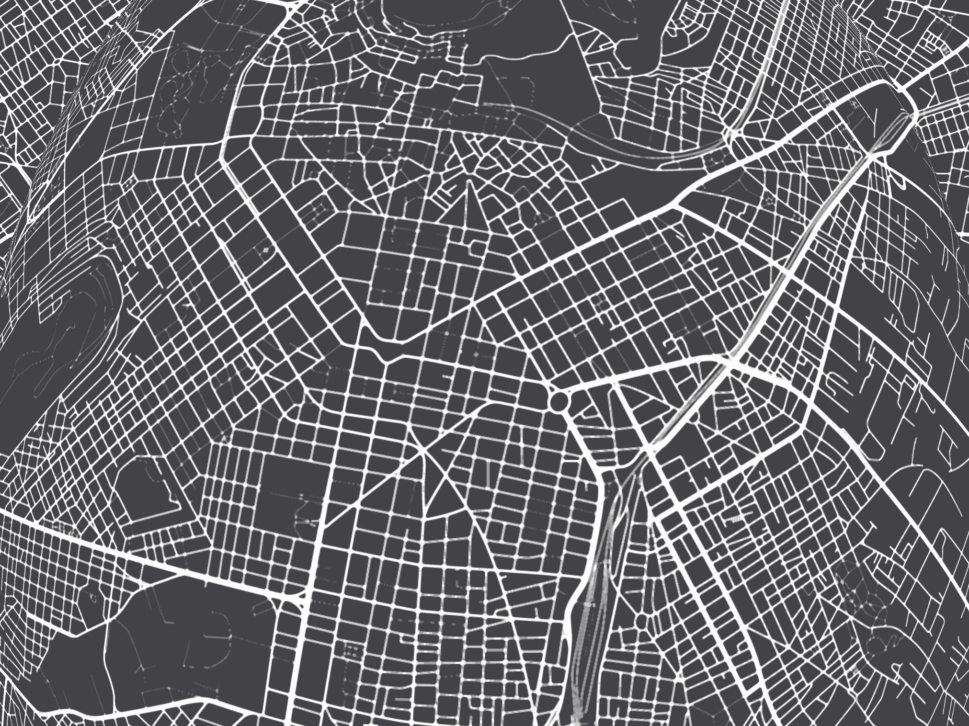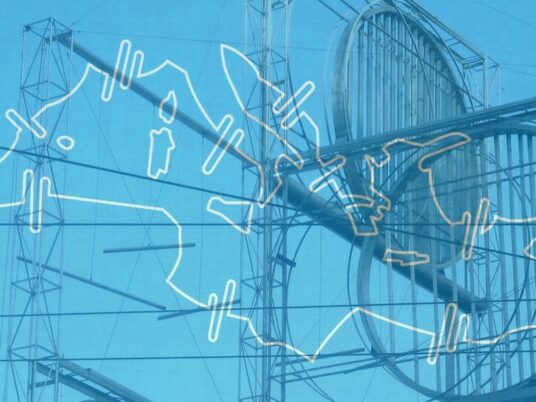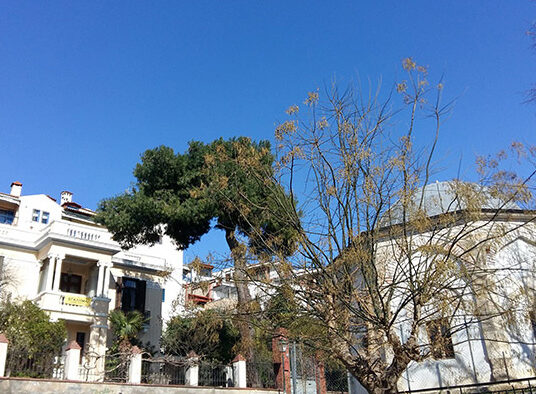Notes on an Anticolonial Athens

Maps of Athens, edited by Tom Western, based on a vector licensed from VectorStock
By: Tom Western
There’s a history that flickers and never fully comes into focus. An anticolonial Athens.[1] Not in the sense of the new capital after Greek independence in the 1820s – that’s something else. But an attempt to place the city into global relations of decolonial struggle in the decades following World War II and after. In 1957, strands of the Greek (and Cypriot) Left sought to convene a ‘World Anticolonial Conference’ in Athens, building connections with institutions working against imperialism in Europe, with movements around the Mediterranean and beyond – adding Greece to Afro-Asian solidarities that had animated the Bandung gathering two years previously, and what later became the Tricontinental.[2] The event never happened. Scuppered by French and Portuguese diplomats and by U.S. Cold War anxieties, the conference morphed into a series of smaller events, including an ‘Anticolonial Conference of the Mediterranean’ at the end of 1957, and the development of a ‘Permanent Committee for Anticolonial Struggle of the Mediterranean’, chaired by Nikos Pouliopoulos.[3]
At street level, too, an anticolonial energy pulses through movements and demonstrations in the city. 1973: The name Salvador Allende was painted on the walls and shouted from the streets during Polytechneio student revolt against the military dictatorship.[4] In the tavernas of the late 1970s, “the discussion revolved around the ‘anti-imperialist struggle’, such as the Vietnam War, the Pinochet dictatorship in Chile and the national liberation movement in Angola”.[5] Into the present, solidarity (however fractured) with Palestine and with Kurdistan, an Athenian take on Black Lives Matter,[6] and of course ongoing struggles against US imperialism, EU-led austerity, and the border politics of Fortress Europe, all feed into the rhythms and relations of resistance in the city. Athens, in other words, has its anticolonial pasts and afterlives – albeit ones that are usually buried beneath the marble weight of national history.
This short essay works with these energies and memories, but also seeks to write an anticolonial Athens in another way. Not just placing national struggles into international relations, but instead offering a remapping of the city. This text finds its cartography through a gathering of ideas from Athenian activists and poets, from anticolonial thinkers and writers, from geographers and historians of the Mediterranean. It thinks the city in circles and circulations rather than straight lines and linear histories: decentring Eurocentrisms that continuously claim Athens as its wellspring and symbol of superiority, and instead placing the city into geographies of contestation and histories that are mobile. From this gathering, an Athens emerges that sings long histories of movement, encounter, exchange. An Athens that contests the colonial logics of borders and citizenship regimes. An Athens built on relation and commonality. An anticolonial Athens.

Mobile Histories
Imagine the city as two shapes. One is in straight lines: the long boulevards, the urban plan. This Athens is Euro-Athens – installed as capital of the new nation, obscuring Ottoman pasts, orchestrated by Bavarian kings and Parisian architects, projected onto idealised images of the ancient polis. Straight lines between monuments; straight lines between the past and present. This Athens has long been enrolled in imperial thinking. Routinely invoked as a sign and a symbol, greedily grabbed at as the civilisational origin point, played as a card in the deck of empire, built and imagined as monument of Europeanness. This Athens is also the territory, the citizenship regime, the ethnos – the substance of the Greek state, drawing lines around Greekness based on religion, language, ethnicity, homogeneity, suspicion.
The second is made from circles. It places the city on the Mediterranean – a space defined by movements and circulations. This is anticolonial Athens. Where migration and diversity are not seen as something new, but constitute the very fabric of the city. This is Black Athena, where this thing called Hellenism emerges not as the wellspring of European thought, but through influence and exchange with the Egyptians and the Phoenicians and all around the sea and with cultures from elsewhere in Africa and Asia.[7] This is the poetry of Nicolas Calas, who in 1933 wrote a ‘Circular Symphony’ about Omonoia – on the square as a circle, and the whole city as a circulation, containing everyone and everything, turning, spinning, struggling, resisting, full of hope.[8] This Athens is the trajectory, the relation, the movement.
This circular Athens resounds with decolonial ideas. It thinks from other horizons, opens connections and commonalities, aligns with anticolonial thought in showing the long histories of European reliance on the rest of the world.[9] If we place Athens on the Mediterranean, we find a poetics wherein people have long frustrated the effort to impose an elite European culture onto everyday Mediterranean life. Ioanna Theocharopoulou, writing of the construction of modern Athens, calls this the “popular-Eastern Mediterranean”: something that plays out in language, in architecture, in music, in cultural identity, and in uses of urban space, and which draws attention to the multiple Athenian cultures that have co-existed for centuries.[10]
We also find geographies of contestation, cartographies of struggle. Athens speaks across radical trajectories that span seas and continents – with Alexandria, Beirut, Cairo, Damascus, and beyond. As Ilham Khuri-Makdisi shows us, in the late-19th century, cities in the Eastern Mediterranean played a central role in a “global radical moment”, with the circulation of knowledge, ideas, and political thought allowing people “to connect and create imagining communities and ties of solidarity across lands and seas”[11]. Radical thought has long travelled alongside the movement of people around the Mediterranean, with political ideas and principles circulating in multiple languages, and political cultures developing that don’t map onto national(ist) and Eurocentric histories. Both the city and the sea are spaces of circulation, imagination and mobilisation.
Yet these mobile histories have been tethered, enclosed – the Athenian landscape repeatedly whitewashed in efforts to make these exploded trajectories, ex-centric cultures, and scattered co-existences disappear. “The Mediterranean is not merely geography”, to borrow a line from Predrag Matvejevic’s cultural study of the sea. “Its boundaries are drawn in neither space nor time. There is in fact no way of drawing them: they are neither ethnic nor historical, state nor national; they are like a chalk circle that is constantly traced and erased”.[12] The task of an anticolonial Athens becomes one of nourishing these circles and circulations, and the resulting ways of thinking and knowing and being in the city.

Relational City
This is not just some academic exercise! Across the city, in social centres, cultural associations, activist groups, informal spaces, streets and plateias, people are engaged in anticolonial study and praxis. Athenian organisations – Generation 2.0, Anasa Cultural Centre, the United African Women’s Organisation – have called out the forgetfulness of history and the racisms of citizenship regimes.[13] Newer groups – Victoria Square Project, the Syrian and Greek Youth Forum – push against dividing lines of ‘refugee’ and ‘citizen’, ‘migrant’ and ‘Athenian’.[14] All, in different ways, expose the ways that Greece, despite not being a modern colonial power, has embraced the colonial logics of citizenship – whereby people are racialised, placed into hierarches and placed at various distances from the idea of ‘European civilisation’.[15] All these organisations reimagine questions of being and belonging in the city, and remake citizenships against citizenship.
Το κίνημα (to kinima, as the leftist movement is known in Greece) builds on κίνηση (kinisi: the movement of people, ideas, and things). Both kinds of movement can – should! – be thought together. And the result is a relational city – an Athens that contains multiple cities inside it, based both on old entanglements of cultures and people, and on newer ideas and creativities. The city becomes a testing ground of activisms, a song of solidarities, an amplifier of demands, an abundance of languages.
This is the Athens I seek to hear and cultivate in my own work. In a series of videos from 2020, I narrate the city through an imagined conversation between the Athenian poet Calas and the great anticolonial theorist Édouard Glissant, who both think in circles and circulations, and make a musical language that sounds out the rhythms and relations of struggle.[16] Athens becomes an open circle – like so many dances from all around the Eastern Mediterranean. (The ideas in these videos and this blogpost are the basis of a book I’m now writing entitled Circular Movements.)
We do this work, too, in the Syrian and Greek Youth Forum (I’ve been a member since 2018): developing methods of creative activism, using culture as a tool of political participation, of finding connections and shared histories, of belonging and becoming the city. As my colleague Kareem Kabbani puts it in a video we made recently: “We can see in Athina – the place that we belong – we can feel many different cities, acting in the same circle, acting in the same direction”.[17] Relational and collective geographies remap and remake the city.
In all cases, imagination becomes a method of social transformation, required to think things otherwise: to unmake borders, to form counterpublics, to assert presence and belonging, to open the city. And again, all of this is a form of anticolonial study through which, in Katherine McKittrick’s brilliant words, “one can observe an ongoing method of gathering multifariously textured tales, narratives, fictions, whispers, songs, grooves”.[18]
Anticolonial study and imagination are methods of anti-crisis. They refuse the colonial logics of border regimes and citizenship. They refuse the narration of the sea as only a border, a graveyard, a carceral space. They focus on emergence rather than emergency. They tell of the everyday efforts to build a polis, a centre of political action, which is decentred and multiple. Athens, in sum, takes its place on the Black Mediterranean, imagining the sea as “a site of cultural syncretism and radical possibility rather than a watery grave and site of dispossession”.[19] And to finish where I started, a feedback loop of anticolonial energy continues to pulse around the city and around the sea.

[1] I use ‘anticolonial Athens’ rather than ‘decolonise Athens’ as I seek to foreground particular kinds of thought and sets of actions, both in history and in the present, that feed into the larger conversations and interventions of Decolonize Hellas. I follow Priyamvada Gopal, who posits anticolonialism as the bit that comes between colonialism and decolonisation, making it a precondition for decolonisation of any kind. She writes: “a serious engagement with ‘decolonisation’ today requires us precisely to think through the resonances of anticolonialism”, and that anticolonialism is the “missing term” in academic discussions of decolonisation today. Decolonisation learns from anticolonialism, which connects directly with my aims in this piece: to learn from people working in the past and in the present, in an attempt to offer a useful contribution to the conversations unfolding on and around this initiative. Priyamvada Gopal, 2021, ‘On Decolonisation and the University’, Textual Practice, 35(6), 886.
[2] See, for example, Quỳnh N. Pham and Robbie Shilliam, ed. Meanings of Bandung: Postcolonial Orders and Decolonial Visions (London: Rowman and Littlefield, 2016); and Anne Garland Mahler, From the Tricontinental to the Global South: Race, Radicalism, and Transnational Solidarity (Durham, NC: Duke University Press, 2018).
[3] Ioannis D. Stefanidis, Stirring the Greek Nation: Political Culture, Irridentism and Anti-Americanism in Post-War Greece, 1945-1967 (New York: Routledge, 2016), 106-107. This later became the ‘Committee for the Struggle Against Colonialism in the Mediterranean and Middle East Region’, again presided over by Pouliopoulos. Kostis Kornetis, 2015, ‘“Cuban Europe? Greek and Iberian Tiersmondisme in the “Long 1960s”’. Journal of Contemporary History, 50(3): 491.
[4] Kornetis, ‘Cuban Europe?’, 509-510.
[5] Nikolaos Papadogiannis, 2010, ‘Greek Communist Youth and the Politicisation of Leisure, 1974-1981’. Unpublished PhD dissertation, University of Cambridge, 188-189.
[6] See, for example, the discussion, ‘9 Afrogreeks Discuss: What Does “I Can’t Breathe” Mean in Greece?’, 2020, ed. Jackie Abhulimen and Eirini Niamouaia (Athens: Onassis Stegi) – https://www.onassis.org/video/9-afrogreeks-discuss-what-does-i-cant-breathe-mean-in-greece
[7] Martin Bernal, Black Athena: The Afroasiatic Roots of Classical Civilisation (London: Vintage, 1991).
[8] Νικόλαος Κάλας, Γραφή και Φως [Writing and Light] (Αθήνα: Ίκαρος, 1998). See also Effie Rentzou, 2008, ‘Stranger in the City: Self and Urban Space in the Work of Nicolas Calas’, Journal of Modern Greek Studies, 26(2): 283-309.
[9] Both in its riches and resources, and in its thinking and theory, Europe is built upon the labour of the whole world – is dependent on what Lisa Lowe calls the “intimacies of four continents”. To maintain a sense of civilizational superiority and the idea of Europe as a discrete entity, colonialism requires a deliberate destruction – Aimé Césaire calls it a “forgetting machine” – of all kinds of pasts. Lisa Lowe, The Intimacies of Four Continents (Durham, NC: Duke University Press, 2015); Aimé Césaire, Discourse on Colonialism, trans. Joan Pinkham (New York: Monthly Review Press, 2000[1955]), 52.
[10] Ioanna Theocharopoulou, Builders, Housewives and the Construction of Modern Athens (Athens: Onassis Foundation, 2017), 55-60. See also Eleni Bastéa, The Creation of Modern Athens: Planning the Myth (Cambridge: Cambridge University Press, 2000).
[11] Ilham Khuri-Makdisi, The Eastern Mediterranean and the Making of Global Radicalism, 1860-1914 (Berkeley, CA: University of California Press, 2013), 32.
[12] Predrag Matvejevic, Mediterranean: A Cultural Landscape, trans. Michael Henry Heim (Berkeley, CA: University of California Press, 1999), 10.
[13] E.g. Viki Zaphiriou-Zarifi, ‘The Collective Mobilisation of African Women in Athens “United We Stand”’, in To Exist is to Resist: Black Feminism in Europe, ed. Akwugo Emejulu and Francesca Sobande (London: Pluto Press, 2019), 13-33.
[14] Tom Western, 2020, ‘Migratory Activisms in the Eastern Mediterranean’, IDEES, 51, special issue on ‘A New Mediterranean Vision’ – https://revistaidees.cat/en/migratory-activisms-in-the-eastern-mediterranean/
[15] Lisa Lowe, The Intimacies of Four Continents; Andrea Dyrness and Enrique Sepúlveda. Border Thinking: Latinx Youth Decolonizing Citizenship (Minneapolis, MN: University of Minnesota Press, 2020).
[16] The imagined conversation as structuring device is inspired by Sara Salem’s wonderful book, Anticolonial Afterlives in Egypt: The Politics of Hegemony (Cambridge: Cambridge University Press, 2020).
[17] SGYF, ‘Becoming the City’, in The City Talks Back, ed. Theatrum Mundi and Onassis Foundation (2021 – https://backtalks.city/project/becoming-the-city/).
[18] Katherine McKittrick, Dear Science and Other Stories (Durham, NC: Duke University Press, 2021), 4.
[19] S.A. Smythe, 2018, ‘The Black Mediterranean and the Politics of Imagination’, Middle East Report, 286: 9.
Cite as: Western, Tom. 2021. “Notes on an Anticolonial Athens.” Decolonize Hellas blog, 3rd August https://decolonizehellas.org/en/notes-on-an-anticolonial-athens/
Tom Western is a Lecturer in Social and Cultural Geography at UCL and a member of the Syrian and Greek Youth Forum with whom he runs the Active Citizens Sound Archive. Tom is currently writing about an ‘anticolonial Athens’ – placing the city into contested geographies and mobile histories — and a member of the dëcoloиıze hellάş Memory-Monuments Working Group.




